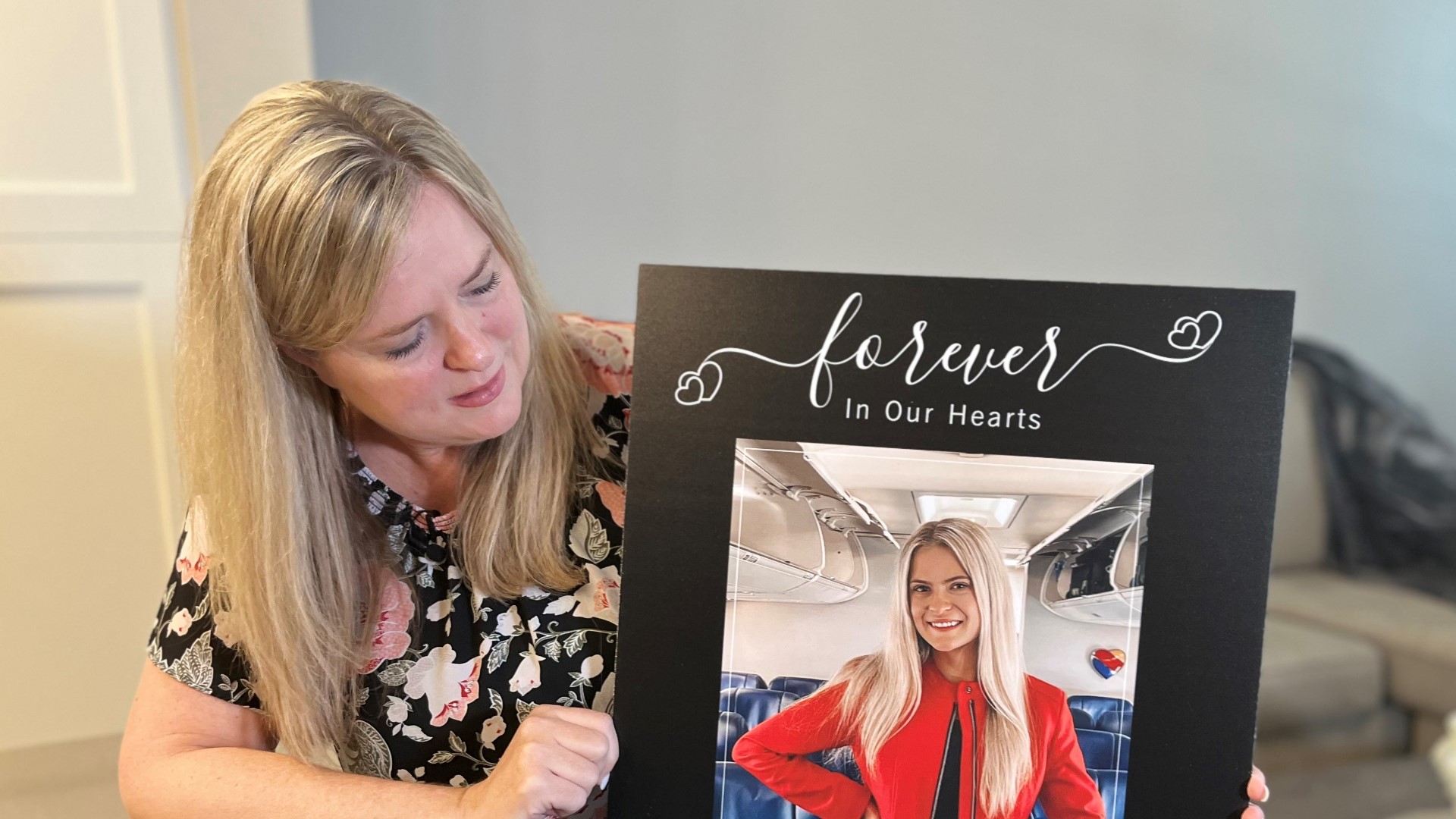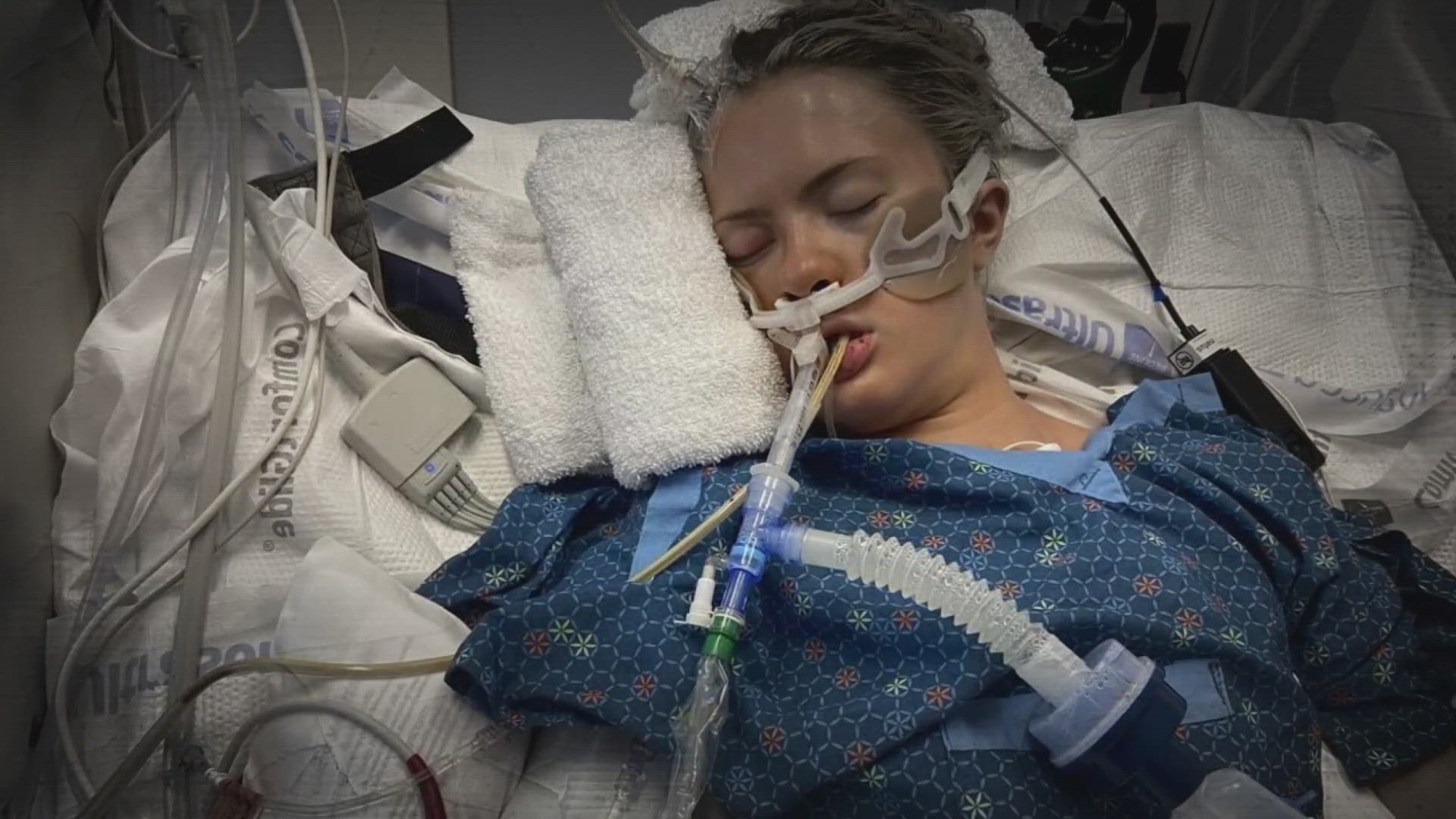A mother's mission to end Florida's 'Free Kill' law
If you die of medical negligence in Florida and are over 25, not married, and have no children under 25, your family has no right to sue for damages.

No right to sue
Right now, in Florida if you die due to medical negligence and you’re over 25, not married, and have no children under the age of 25 your loved ones can’t sue the doctors or hospital for damages.
“What's horrifying is how many families are been affected by this, and no one seems to know about it,” Cindy Jenkins said.
Jenkins, who lives in St. Johns County, learned about the law after her 25-year-old daughter, Taylor Jenkins, died in a Florida hospital this past March.


“Taylor was just a gift to the world who was full of love and light. Everybody loved her,” Jenkins said. “Our whole world has come to a halt, and it's forever altered and everyone else's is status quo. I just keep saying how is this happening in the United States of America?”
She believes her daughter would still be alive if it wasn’t for what she says were errors made at the hospital.
“I just think, what a senseless loss of life, because it wasn't one error by one person,” Jenkins said. ”It was a series of errors over and over throughout the day.”
Taylor, a flight attendant who grew up in Clay County, had been out celebrating St. Patrick's Day with friends in Orlando when she was in a car accident.
“She was on her way home, sitting at the red light with her seatbelt on and doing all the right things to quote Florida Highway Patrol, and another driver rear-ended her at a pretty high rate of speed,” Jenkins said.
She was rushed to the hospital where Jenkins says her daughter was treated for a traumatic brain injury.
“I paid for an autopsy after Taylor passed away, and the autopsy says there were no subdural hematomas,” Jenkins said. “What she did have was a small collection of blood outside of her skull between her skull and in her scalp. The brain injury appears to be a misdiagnosis.”
The original Medical Examiner’s Report listed blunt head trauma as the cause of death and a torn artery as a contributing factor. A subdural hematoma was listed under findings by medical records. But the report was later amended to list the cause of death as a torn artery due to blunt force pelvic trauma. Blunt force head and neck trauma are listed as contributing factors with no mention of a subdural hematoma.
The chief medical examiner wrote, “The report findings have been rearranged/modified after receipt of additional information.”
Jenkins says doctors failed to identify the torn artery in her daughter's pelvis until hours later.
“She comes out of the CT scan, and they realize she has a life-threatening torn artery, pretty much has gone into heart failure, organ failure. She sustained hypoxic brain injury from lack of getting blood and oxygen to her brain.”
She’s convinced the hospital is responsible for Taylor’s death.
“You can’t convince me otherwise,” Jenkins said. “They ran with the brain injury diagnosis, and she laid there and bled internally for hours and hours.”
Had Taylor died months earlier when she was 24, her mother would have sued. But because she was 25 at the time of her death, no attorneys would take the case.


“That’s when the questions began. How old was Taylor? She just turned 25. Was she married? Not yet. Did she have children? No. We can't help you. And that's when I learned about Florida's ‘Free Kill” law,” Jenkins said.
Florida's 'Free Kill' law
The law has been on the book since the 90s.
“If a doctor makes an error right on the operating table that could lead to your death, there's not really an incentive to try to save you. And the reason for that is that the living can sue but the dead cannot. And we call that a free kill because it's virtually free to let the patient expire,” Florida Representative Spencer Roach explained. “But it could potentially be very costly if you save their life. So, it's this perverse medical incentive to let someone die rather than try to save their life because you're trying to avoid a medical malpractice suit.”
For Jenkins it means she doesn’t get her day in court.
“It means that you don't have access to the judicial system to hold negligent doctors and hospitals accountable when they negligently kill your family member. So, they call them a free kill,” Jenkins said. “This doesn't just impact Floridians. There are people in the various groups I’m now in whose parents came on vacation or family members came on business trips and their family member died in a Florida hospital, not even as a Florida resident, and they learn they have no recourse.”
The law only applies to medical negligence. It prohibits claims if the person who died is over the age of 25 and has no spouse and no children under 25.
“It's the number one reason we decline medical malpractice cases,” Attorney Kevin Moore with Farah & Farah said. “There's no recourse for what that doctor did wrong or the nurse or whoever it may be. There's no recourse for that negligence.”
The law was designed to rein in malpractice premiums and keep doctors from leaving Florida. We reached out to the Florida Medical Association and Florida Hospital Association multiple times for comment, but our calls and emails were not returned.
Moore says his office gets calls every day from families stunned to learn they can’t sue for medical malpractice.
“It’s a brother or sister or an adult child, and their mother or their father just passed away. And you can clearly see that there was medical negligence. I mean, even if they were to absolutely just cut off the wrong leg and you die as a result no matter how blatant it is, you still don't have a claim if you don't have a spouse or a minor child,” Moore said.
Efforts to repeal the law have failed, but the fight is not over
Senate Democratic Leader Lauren Book introduced legislation last session to repeal the law, but the bill was not heard. She plans to reintroduce legislation next session.
“Families should be able to seek accountability when a loved one dies in a wrongful death. Unfortunately, Florida arbitrarily and unrealistically narrows who can sue in these cases. This is wrong – no matter who you are or who you leave behind, Florida law should apply to and protect all Floridians equally. Our current laws do not reflect that families come in all shapes and sizes – and family doesn’t stop when you become an adult,” Book said.
The push to repeal the law has bipartisan support. State Senator Clay Yarborough, a Republican, has been hearing from outraged families and says he is also considering sponsoring a bill next session to change the law.
“Most of the medical community is doing a fine job, but we need to make sure that the accountability is there, so that issues like this don't happen again in the future. And these are heart wrenching stories,” Yarborough said. “It's hard to hear this from these individuals that are impacted. And, you know, I'm a firm believer that we really need to look at it and see what changes we can make.”
Republican State Representative Sam Garrison says he would vote again to change the law.
“Malpractice insurance is going to be crushing for physicians. I'm very sympathetic to that,” Rep. Garrison said. “But at the end of the day, when you have an identified case of gross negligence, and you have a family that's suffering, I think the courts ultimately are the place where we get justice.”
Representative Roach is skeptical there’s enough support in the State Senate right to repeal the law, but would like to see it changed.
“Given that we're the only state that has this type of Draconian statute protecting bad doctors who are killing people on the operating table, I think this is a case where Florida needs to follow the rest of the nation, repeal the Draconian law from the books and allow these folks to get their day in court,” Rep. Roach said.
A mother's mission


Jenkins knows it’s going to be a battle to get the law repealed, but that is not stopping her.
“The mindset is that if they took this away, that doctors would leave Florida in droves, because their medical malpractice premiums will go up. And it's just, if you aim for the wrong target, you're going to hit it 100% of the time, you're going to miss the right one 100% of the time. So instead of excluding this population from justice, and protecting negligent doctors, it makes more sense to focus on the real problem, which is the medical malpractice itself. This wouldn’t be an issue if medical malpractice wasn't so rampant.”
She is making it her mission to bring some good out of this tragedy.
“If everybody in every district reaches out to their senator and says no more, the people spoken, we do not want this law, make it go away, that is what it's going to take,” Jenkins said.
First Coast News is not identifying the hospital since it is not named in a lawsuit. When asked about the allegations surrounding Taylor Jenkins death, a hospital spokesperson sent a statement saying, “The death of a loved one is always very difficult, and our hearts go out to this family. We are committed to providing high quality care to our patients and rely on highly trained physicians to make medical decisions based on their expertise and full understanding of each patient's unique healthcare needs.”


